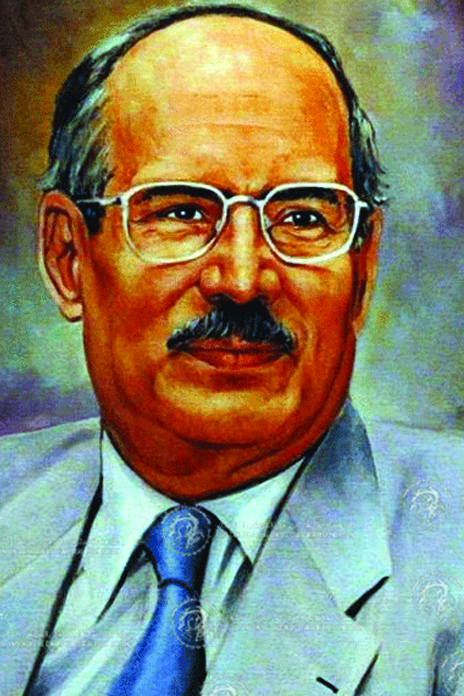
FIFTH SESSION 1996-1997
Human & Future Studies
Painting by : Abdullah Al Muharraqi – Bahrain
- Born in Bahrain in 1939.
- Obtained a BA in Arabic Literature from the American University in Beirut (AUB) in 1963.
- Diploma in Education from AUB, 1963.
- MA in Andalusian Literature from AUB, 1966.
- Attended a postgraduate course at Cambridge University in 1971.
- PhD in Modern and Contemporary Arab and Islamic Thought from AUB, 1979.
- Certificate in French Culture and Language from Sorbonne, France (1982).
- Chairman of Bahrain’s Information Department and Member of the State Council (1969-1971)
- Co-founder and first Chairman of chaired Bahrain’s Writers Association (1969)
- Member of the Founding Council of the Arab World Institute in Paris (1981)
- Lectured at Bahrain’s Higher Institute for teachers, the AUB and at Gulf University.
- Cultural and Scientific Advisor at the Court of His Highness the Crown Prince of Bahrain.
- Dean of Graduate Studies and Professor of Islamic Culture and Modern Thought at Gulf University in Bahrain
- Member of Bahrain’s National Council of Culture, Arts and Literature
Decision of the General Secretariat :
Dr. Al Ansari’s work reflects a harmonious critical vision that is showcased within the framework of the prevailing Arab ideology, with an eye on the awaited renaissance stage. His works also focus on diagnosing the Arab situation, politically, socially and culturally.
Awards :
- The Kuwait Foundation for the Advancement of Sciences Award (Kuwait), 1981.
- Bahrain State Merit Award for Outstanding Achievement, (1989)
- GCC Leaders’ Medal, Masqat Summit (1989).
Famous Works :
- Al Majmou’a Al Kamila Li A’mal Al Sheikh Ibrahim Mohammed Al Khalifa, (The Complete Works of Sheikh Ibrahim Mohammad Al Khalifa, compilation, 1968)
- Lamahat Min Al Khaleej (Glimpses of the Gulf)
- Al Khaleej, Iran Wal Arab (The Gulf: Iran and the Arabs, 1972)
- ‘Hal Kano Amalika?’ wa Maqalat Ukhra (‘Were They Giants?’ and Other Essays, 1985)
- Tahawwulat Al Fikr Wal Siyasa fil Sharq Al Arabi (Trends of Thought and Politics in The Eastern Arab World, 1988)
- Al Aalam wal Alrab fee 2000 (Arabs and the World in the Year 2000, 1988)
- Al Tafa’ul Al Thaqafi Bayn Al Maghrib Wal Mashriq (Cultural Interaction between the West and the East, Dar Al Gharb Al Islami: Beirut 1992)
- Tajdeed Al Nahda Biktishaf Al That Wa Naqdiha (Renovating the Renaissance Through Self-Discovery and Self-Criticism, Arab Foundation for Studies and Publishing: Beirut 1992)
- Takween Al Arab Al Siyasi wa Maghza Al Dawla Al Qutriyya (Political Structure of the Arabs and the Significance of the Country State, 1994)
- Al Ta’azum Al Siyasi Ind Al Arab wa Maqif Al Islam (Political Crises of the Arab People and the Position of Islam, 1995)
- Al Fikr Al Arabi wa Sira’ Al Addad (Arabic Thought and the Conflict between Opposites, 1996)
Refereed Studies
- Al Urwa Al Wuthqa Wal Manar Al Tawfiqi Bayn Al Asala wal Mu’asara (The Tightest Bond and Reconciliation between Tradition and Modernity, 1984)
- Juthoor Al Tarbiya Al Yabaniyya wa Khasaesha Al Mumayyaza (The Roots of Japanese Culture and Education and its Distinct Features)
- Qira’a Jadeeda fee Tareekh Al Jabrati (A New Reading of History by Al Jabarti)
- Al Hamalat Al Isbaniyya Ala Al Sharq Al Andalusi (Spanish Expeditions against Eastern Andalusia)
- Ishkaliyyat Mafhoom Al Hukm wal Hakimiyy Bayn Al Asl Al Qur’ani wal Isti’mal Al Muhadath (The Problematic of the Concept of Ruling and Authority Between Qura’anic Staples and Modern Usage).
- Mawqif Al Islam Min Namat Al Hayah Al Ra’awiyya fil Quran Al Kareem Wal Sunna Al Nabawiyya (The Stance of Islam on the Pastoral Lifestyle in the Holy Quran and Sunnah)
- Ghiyab Al Mafhoom Al Mu’asasi Al Shamil wal Da’em lil dawla fil Aalam Al Arabi (Absence of a Comprehensive Institutional Concept of the State in the Arab World)
- Thawabet Al Bu’d Al Hadari wa dalalatuh fil Islam Binathrat Muqaranah Ma’ Adyan Wa Madaris Fikriyya Ukhra (The Staples of the Urban Dimension and its Significance in Islam in Comparison to Other Religions and Schools of Thought)
